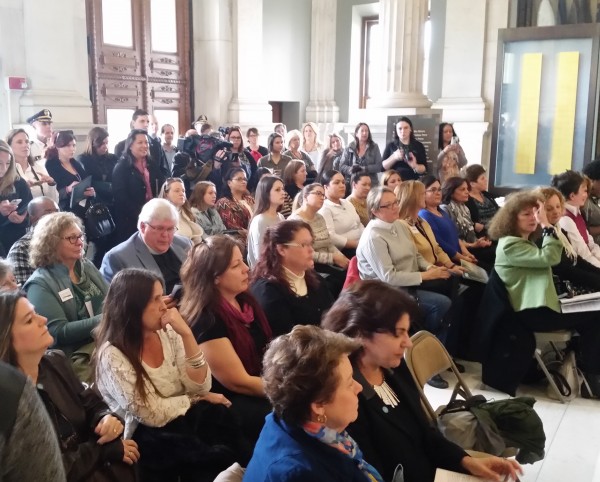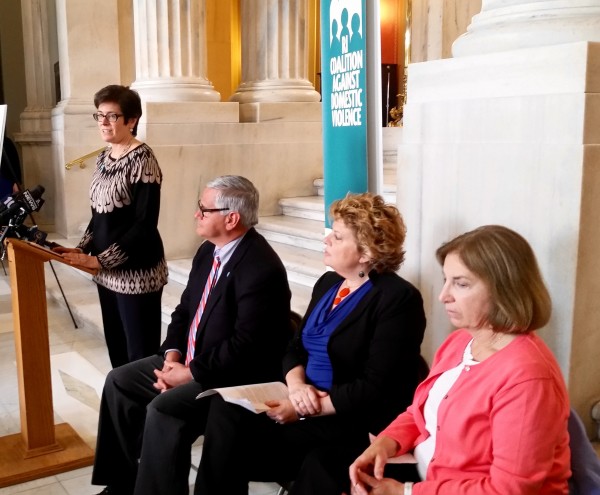
Despite the NRA paying a record fine for making illegal campaign donations to Rhode Island politicians, to date, not one current office holder in the state has seen fit to return the money.
The National Rifle Association (NRA) was fined by the RI Board of Elections for funneling illegal donations to RI politicians, including House Speaker Nicholas Mattiello and Senate President M Teresa Paiva-Weed. One estimate puts the total amount of contributions at over $160,000, over a 10 year period from 2004 to 2014. Due to the detective work of Sam Bell, executive director of the Rhode Island Progressive Democrats of America, the NRA was fined $63,000 and the NRA’s Rhode Island PAC was formally dissolved.
Technically, any money received by any candidate in Rhode Island that comes from the NRA Political Victory Fund PAC before January 2014 was illegal. That doesn’t mean that it’s a crime to keep the money after the fact, and it’s likely that the politicians did not know that the campaign donations were illegal before Bell made his case.
That said, the bottom line is that the money these politicians accepted from the NRA is tainted, and the influence this money has on our General Assembly can be felt acutely when observing the legislature in action.

Are you still wondering why our General Assembly can’t seem to pass common sense gun control legislation?
Between 2004 and 2014, House Speaker Nick Mattiello received $2,975 from the NRA. All these donations appear to be illegal, tainted contributions. The Speaker has kept every penny. Seventeen other representatives have also taken thousands of dollars.
Joseph McNamara is the head of the RI Democratic Party, the same party whose national platform calls for banning assault weapons and strengthening gun laws to prevent violence. McNamara accepted $700 in illegal NRA contributions over the years.
During the same 10 year period, Senate President M Teresa Paiva-Weed has accepted, and kept, what appears to be $6,075 in illegal contributions from the NRA. Seventeen other senators took illegal NRA cash, including Senate Majority Leader Domenic Ruggerio, who raked in $3350 and Senate Judiciary Chair Michael McCaffrey, whose committee handles every bill about guns that comes to the Senate, to the tune of$3500.
Rep Jan Malik, who was recently challenged by his primary opponent Jason Knight to return his illegal donations, took $1075. On the last day of the most recent legislative session, Rep Malik voted for a House bill that would have made it easier to get concealed carry permits in RI before changing his vote after the fact.
I went through the campaign finance reports available here, and carefully made a list of all incumbents who have accepted NRA money between 2004 and 2014.
Here’s the list:
In addition to Representatives and Senators, Attorney General Peter Kilmartin has accepted $1150 in illegal donations.
Attorney General KILMARTIN, PETER F 03/30/2004 $200.00
Attorney General KILMARTIN, PETER F 03/07/2006 $250.00
Attorney General KILMARTIN, PETER F 04/27/2007 $200.00
Attorney General KILMARTIN, PETER F 12/31/2009 $200.00
Attorney General KILMARTIN, PETER F 03/04/2009 $300.00
Former Speaker of the House, William Murphy, now a lobbyist, raked in a series of illegal NRA contributions. He now rakes in even more as a lobbyist for gun interests.
Lobbyist MURPHY, WILLIAM J 02/05/2004 $500.00
Lobbyist MURPHY, WILLIAM J 02/05/2004 $500.00
Lobbyist MURPHY, WILLIAM J 04/14/2006 $350.00
Lobbyist MURPHY, WILLIAM J 04/27/2007 $1,000.00
Lobbyist MURPHY, WILLIAM J 03/31/2005 $875.00
Lobbyist MURPHY, WILLIAM J 02/22/2009 $1,000.00
Lobbyist MURPHY, WILLIAM J 01/31/2008 $1,000.00
Representative MATTIELLO, NICHOLAS 11/05/2006 $250.00
Representative MATTIELLO, NICHOLAS 04/27/2007 $150.00
Representative MATTIELLO, NICHOLAS 04/01/2008 $150.00
Representative MATTIELLO, NICHOLAS 07/06/2010 $450.00
Representative MATTIELLO, NICHOLAS 04/04/2011 $450.00
Representative MATTIELLO, NICHOLAS 06/06/2012 $450.00
Representative MATTIELLO, NICHOLAS 02/13/2013 $800.00
Representative MATTIELLO, NICHOLAS 05/28/2009 $225.00
Representative CARNEVALE, JOHN M 06/05/2010 $200.00
Representative CARNEVALE, JOHN M 04/12/2011 $200.00
Representative CHIPPENDALE, MICHAEL W 10/15/2012 $500.00
Representative CORVESE, ARTHUR J 05/08/2004 $300.00
Representative CORVESE, ARTHUR J 05/16/2005 $300.00
Representative CORVESE, ARTHUR J 07/11/2006 $300.00
Representative COSTA, DOREEN MARIE 10/15/2012 $500.00
Representative DESIMONE, JOHN J 07/08/2004 $150.00
Representative FELLELA, DEBORAH A 08/20/2006 $250.00
Representative FELLELA, DEBORAH A 04/27/2007 $100.00
Representative FELLELA, DEBORAH A 01/12/2010 $150.00
Representative FELLELA, DEBORAH A 04/12/2011 $200.00
Representative JACQUARD, ROBERT B 07/19/2004 $300.00
Representative JACQUARD, ROBERT B 10/20/2004 $500.00
Representative JACQUARD, ROBERT B 10/12/2006 $350.00
Representative JACQUARD, ROBERT B 04/12/2011 $200.00
Representative KENNEDY, BRIAN PATRICK 07/19/2004 $400.00
Representative KENNEDY, BRIAN PATRICK 08/02/2006 $400.00
Representative KENNEDY, BRIAN PATRICK 06/11/2009 $400.00
Representative KENNEDY, BRIAN PATRICK 06/05/2010 $375.00
Representative KENNEDY, BRIAN PATRICK 04/12/2011 $375.00
Representative LIMA, CHARLENE 04/06/2004 $300.00
Representative MACBETH, KAREN 11/01/2009 $100.00
Representative MACBETH, KAREN 05/27/2010 $200.00
Representative MACBETH, KAREN 12/08/2011 $200.00
Representative MALIK, JAN 08/18/2004 $200.00
Representative MALIK, JAN 11/19/2004 $250.00
Representative MALIK, JAN 06/29/2005 $225.00
Representative MALIK, JAN 09/06/2006 $300.00
Representative MALIK, JAN 06/05/2010 $300.00
Representative MCNAMARA, JOSEPH 05/26/2004 $200.00
Representative MCNAMARA, JOSEPH 05/25/2005 $300.00
Representative MCNAMARA, JOSEPH 06/16/2011 $200.00
Representative MELO, HELIO 03/10/2010 $225.00
Representative MELO, HELIO 04/12/2011 $200.00
Representative NEWBERRY, BRIAN C 11/03/2006 $300.00
Representative NEWBERRY, BRIAN C 05/29/2009 $150.00
Representative NEWBERRY, BRIAN C 02/24/2010 $150.00
Representative NEWBERRY, BRIAN C 06/29/2011 $200.00
Representative NEWBERRY, BRIAN C 04/15/2013 $250.00
Representative TRILLO, JOSEPH A 04/02/2004 $100.00
Representative TRILLO, JOSEPH A 04/05/2004 $500.00
Representative TRILLO, JOSEPH A 04/06/2004 $200.00
Representative TRILLO, JOSEPH A 04/07/2004 $100.00
Representative TRILLO, JOSEPH A 04/22/2004 $150.00
Representative TRILLO, JOSEPH A 06/29/2005 $200.00
Representative TRILLO, JOSEPH A 06/15/2006 $300.00
Representative TRILLO, JOSEPH A 07/24/2007 $300.00
Representative TRILLO, JOSEPH A 05/17/2008 $300.00
Representative TRILLO, JOSEPH A 05/29/2009 $300.00
Representative TRILLO, JOSEPH A 06/05/2010 $300.00
Representative TRILLO, JOSEPH A 04/12/2011 $200.00
Representative UCCI, STEPHEN R 11/19/2004 $500.00
Representative UCCI, STEPHEN R 08/21/2006 $250.00
Representative UCCI, STEPHEN R 11/02/2006 $200.00
Representative UCCI, STEPHEN R 07/27/2007 $300.00
Representative UCCI, STEPHEN R 06/29/2009 $200.00
Representative UCCI, STEPHEN R 06/29/2009 $200.00
Representative UCCI, STEPHEN R 06/25/2011 $200.00
Representative UCCI, STEPHEN R 06/15/2010 $200.00
Representative WINFIELD, THOMAS J 08/22/2004 $200.00
Representative WINFIELD, THOMAS J 06/15/2006 $200.00
Representative WINFIELD, THOMAS J 11/06/2006 $90.00
Representative WINFIELD, THOMAS J 08/10/2007 $225.00
Senator PAIVA WEED, M TERESA 02/24/2011 $1,000.00
Senator PAIVA WEED, M TERESA 02/02/2012 $1,000.00
Senator PAIVA WEED, M TERESA 08/12/2013 $800.00
Senator PAIVA WEED, M TERESA 04/22/2004 $375.00
Senator PAIVA WEED, M TERESA 05/14/2007 $500.00
Senator PAIVA WEED, M TERESA 05/17/2008 $400.00
Senator PAIVA WEED, M TERESA 02/11/2009 $1,000.00
Senator PAIVA WEED, M TERESA 02/24/2010 $1,000.00
Senator CICCONE III, FRANK A 07/10/2004 $150.00
Senator CICCONE III, FRANK A 05/25/2005 $225.00
Senator CICCONE III, FRANK A 06/21/2006 $300.00
Senator CICCONE III, FRANK A 11/03/2006 $300.00
Senator CICCONE III, FRANK A 05/07/2007 $300.00
Senator CICCONE III, FRANK A 04/15/2008 $300.00
Senator CICCONE III, FRANK A 06/03/2009 $300.00
Senator CICCONE III, FRANK A 06/12/2010 $300.00
Senator CICCONE III, FRANK A 06/21/2013 $400.00
Senator COTE, MARC A 03/23/2004 $200.00
Senator COTE, MARC A 05/16/2005 $200.00
Senator COTE, MARC A 06/15/2006 $200.00
Senator COTE, MARC A 04/16/2008 $200.00
Senator COTE, MARC A 04/06/2010 $200.00
Senator DAPONTE, DANIEL 02/24/2010 $200.00
Senator DAPONTE, DANIEL 04/12/2011 $200.00
Senator DOYLE II, JAMES E 06/17/2006 $150.00
Senator DOYLE II, JAMES E 03/31/2008 $300.00
Senator FELAG JR, WALTER S 07/04/2004 $200.00
Senator FELAG JR, WALTER S 09/01/2006 $300.00
Senator FELAG JR, WALTER S 06/15/2008 $300.00
Senator FELAG JR, WALTER S 03/03/2010 $300.00
Senator FELAG JR, WALTER S 04/12/2011 $300.00
Senator FOGARTY, PAUL W 05/13/2004 $100.00
Senator FOGARTY, PAUL W 07/01/2005 $150.00
Senator FOGARTY, PAUL W 09/21/2007 $150.00
Senator FOGARTY, PAUL W 01/10/2008 $150.00
Senator FOGARTY, PAUL W 06/11/2009 $200.00
Senator GALLO, HANNA M 06/01/2004 $150.00
Senator GALLO, HANNA M 05/24/2005 $150.00
Senator GALLO, HANNA M 05/17/2008 $150.00
Senator GALLO, HANNA M 08/05/2009 $200.00
Senator GALLO, HANNA M 04/28/2011 $200.00
Senator GALLO, HANNA M 04/12/2011 $200.00
Senator GOODWIN, MARYELLEN 08/16/2004 $150.00
Senator GOODWIN, MARYELLEN 07/09/2010 $200.00
Senator GOODWIN, MARYELLEN 05/13/2011 $200.00
Senator LYNCH PRATA, ERIN P 06/08/2009 $200.00
Senator LYNCH PRATA, ERIN P 06/10/2010 $200.00
Senator LYNCH PRATA, ERIN P 04/12/2011 $200.00
Senator MCCAFFREY, MICHAEL J 07/21/2004 $500.00
Senator MCCAFFREY, MICHAEL J 07/21/2005 $750.00
Senator MCCAFFREY, MICHAEL J 08/06/2006 $750.00
Senator MCCAFFREY, MICHAEL J 08/07/2007 $750.00
Senator MCCAFFREY, MICHAEL J 06/24/2008 $750.00
Senator MCCAFFREY, MICHAEL J 06/05/2009 $750.00
Senator MCCAFFREY, MICHAEL J 06/15/2010 $750.00
Senator MCCAFFREY, MICHAEL J 05/20/2011 $750.00
Senator MCCAFFREY, MICHAEL J 06/28/2013 $400.00
Senator PICARD, ROGER A 07/19/2004 $200.00
Senator PICARD, ROGER A 08/03/2005 $200.00
Senator PICARD, ROGER A 05/15/2006 $250.00
Senator PICARD, ROGER A 06/20/2009 $300.00
Senator PICARD, ROGER A 06/12/2010 $150.00
Senator RAPTAKIS, LEONIDAS P 05/10/2006 $300.00
Senator RAPTAKIS, LEONIDAS P 07/24/2007 $300.00
Senator RAPTAKIS, LEONIDAS P 06/30/2008 $300.00
Senator RAPTAKIS, LEONIDAS P 02/26/2013 $250.00
Senator RAPTAKIS, LEONIDAS P 07/19/2004 $300.00
Senator RUGGERIO, DOMINICK J 05/19/2004 $300.00
Senator RUGGERIO, DOMINICK J 05/25/2005 $300.00
Senator RUGGERIO, DOMINICK J 05/10/2006 $300.00
Senator RUGGERIO, DOMINICK J 04/27/2007 $300.00
Senator RUGGERIO, DOMINICK J 05/17/2008 $300.00
Senator RUGGERIO, DOMINICK J 02/21/2013 $500.00
Senator RUGGERIO, DOMINICK J 05/29/2009 $300.00
Senator RUGGERIO, DOMINICK J 02/24/2011 $450.00
Senator RUGGERIO, DOMINICK J 02/08/2012 $500.00
Senator SERPA, PATRICIA A 07/01/2009 $150.00
Senator SERPA, PATRICIA A 06/05/2010 $150.00
Senator SERPA, PATRICIA A 07/18/2011 $200.00
Senator SERPA, PATRICIA A 03/30/2013 $250.00
Senator SHEEHAN, JAMES C 05/04/2004 $150.00
Senator SHEEHAN, JAMES C 07/08/2005 $150.00
Senator SHEEHAN, JAMES C 07/24/2007 $100.00
Senator SOSNOWSKI, V SUSAN 07/28/2004 $200.00
Senator SOSNOWSKI, V SUSAN 10/18/2004 $100.00
Senator SOSNOWSKI, V SUSAN 04/08/2008 $200.00
Senator SOSNOWSKI, V SUSAN 03/02/2010 $200.00
Senator SOSNOWSKI, V SUSAN 06/16/2011 $200.00
Senator WALASKA, WILLIAM A 04/26/2004 $300.00
Senator WALASKA, WILLIAM A 04/05/2005 $300.00
Senator WALASKA, WILLIAM A 09/01/2006 $300.00
Senator WALASKA, WILLIAM A 05/02/2007 $300.00
Senator WALASKA, WILLIAM A 05/17/2008 $300.00
Senator WALASKA, WILLIAM A 06/07/2009 $300.00
Senator WALASKA, WILLIAM A 06/05/2010 $300.00
Senator WALASKA, WILLIAM A 04/12/2011 $300.00
RI HOUSE DEMOCRATIC LEADERSHIP COMMITTEE 04/29/2004 $300.00
RI HOUSE DEMOCRATIC LEADERSHIP COMMITTEE 09/15/2005 $300.00
RI HOUSE DEMOCRATIC LEADERSHIP COMMITTEE 04/06/2006 $200.00
SENATE DEMOCRATIC LEADERSHIP COMMITTEE 04/21/2004 $625.00
SENATE DEMOCRATS 2004 PAC 08/16/2004 $600.00
 Remember last summer when Attorney General Peter Kilmartin took the Health Insurance Commissioner to court over her decision on Blue Cross rates for individuals? Well, there are now some encouraging signs that these two government agencies are ready to patch things up.
Remember last summer when Attorney General Peter Kilmartin took the Health Insurance Commissioner to court over her decision on Blue Cross rates for individuals? Well, there are now some encouraging signs that these two government agencies are ready to patch things up.
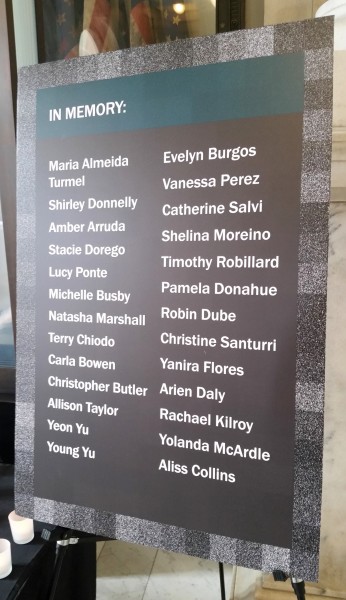 During the past ten years, from 2006 to 2015, 54 people lost their lives to domestic violence homicides in Rhode Island over the course of 48 incidents, says a new report from the Rhode Island Coalition Against Domestic Violence (RICADV). Domestic Violence Homicides in Rhode Island, 2006-2015 is a first-of-its-kind report. The report contains key findings, homicide incident descriptions, and recommendations for preventing future domestic violence homicides in Rhode Island.
During the past ten years, from 2006 to 2015, 54 people lost their lives to domestic violence homicides in Rhode Island over the course of 48 incidents, says a new report from the Rhode Island Coalition Against Domestic Violence (RICADV). Domestic Violence Homicides in Rhode Island, 2006-2015 is a first-of-its-kind report. The report contains key findings, homicide incident descriptions, and recommendations for preventing future domestic violence homicides in Rhode Island.
By analyzing the collective data, the report delivers some key findings:
- Domestic violence homicide is a violence against women issue: Of the 45 victims killed in intimate partner homicide incidents, 34 (76 percent) were women.
- Guns and domestic violence continue to be a deadly combination: Firearms made already violent situations more deadly. In every incident where a bystander was killed, a gun was used.
- Many of the intimate partner homicide incidents shared common elements that are known to indicate a heightened risk of homicide: In 14 of the 41 cases, there were indications that the perpetrator had been stalking the victim, 20 of the 41 perpetrators had been arrested for domestic violence in the past, and in 22 of the 41 cases there was evidence that the victim had already left or was planning to leave when the homicide occurred.
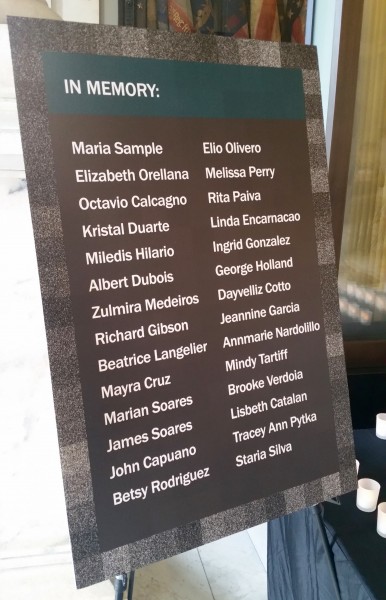 The report offers five recommendations:
The report offers five recommendations:
- Rhode Island must continue to invest in coordinated community response to domestic violence and foster collaboration between law enforcement, courts and victim advocates.
- Rhode island must implement dangerousness assessment and screen all domestic violence criminal cases for lethality risk factors.
- Rhode Island must pass legislation to prohibit convicted domestic violence perpetrators and perpetrators subject to domestic violence restraining orders from possessing guns.
- Rhode Island must pass legislation to strengthen the state’s current laws against stalking and consistently enforce protective orders.
- Rhode Island must take steps to stop domestic violence before it happens in the first place and establish a fund that will support evidence-substantiated public health approaches to the primary prevention of domestic violence.
At the press conference to announce the report there were two posters bearing the names of all those murdered in Rhode Island in domestic violence incidents. Two women told heartbreaking stories about losing a family member to domestic violence. In the first, Jami Ouellette talks about her sister Stacy’s death at the hands of her abusive husband. The story is graphic and chilling.
Next, Ann Burke tells of her daughter’s death from intimate partner homicide. A health teacher, Burke has been instrumental in getting the state to teach teens about intimate partner violence, but she has been doing so without any funding since the program began. She co-founded the Lindsay Ann Burke Memorial Fund in he daughter’s memory.
Deborah DeBare, executive director of the RICADV walks us through the report.
Rhode Island Attorney General Peter Kilmartin also spoke. He has been a strong advocate for the prevention of domestic violence.
]]>
Governor Gina Raimondo launched an initiative to reinvent Rhode Island’s criminal justice system, with hopes of reducing recidivism rates, analyzing racial disparities within prisons, and properly treating addiction and mental illness. The initiative, known as the Justice Reinvestment Working Group, will work closely with The Pew Charitable Trusts, the U.S. Department of Justice’s Bureau of Justice Assistance, and the Council of State Governments to make the state’s criminal justice system more effective at a smaller cost.
Governor Raimondo compared the group’s creation to her Reinventing Medicaid task force that was brought together last year. Just as Rhode Island has the second highest enrollee cost for Medicaid in the country, Rhode Island also has the third highest probation rate in the nation, with 2,737 people on probation per 100,000 residents. One in 44 Rhode Islanders are on probation, and one in 21 Providence residents are on probation.
“Similar to Medicaid, we’re spending too much money, and not getting the outcomes that people deserve,” she said.
Half of state costs related to public safety are spent on the Department of Corrections, totaling in at around $408.5 million. Only 8 percent, or $15 million, of that budget goes to probation and parole services.
“Here’s the reality,” Raimondo said. “We have to direct our resources more effectively in the probation and parole system as well. If you’re trying to supervise everybody, you’re not really supervising anybody.”

The working group, which will be co-chaired by Rhode Island Supreme Court Chief Justice Paul Suttell, and retired Superior Court Associate Justice Judith Savage, puts together stakeholders in the system to study these issues, and create a set of recommendations to give to the state in several months time. They will look at what other states have done to improve their own systems, and use a data driven approach to create new standards for Rhode Island.
Although reducing costs is a large part of what the group hopes to accomplish, Governor Raimondo’s main focus for them is to create a more fair justice system. The working group will find ways to improve treatment for those who suffer from addiction and mental illness, rather than continually incarcerating them. They will also evaluate how to reduce the recidivism rate, which was 48 percent in 2009, as well as analyze racial disparities to figure out exactly who is being arrested and on what charges. According to Raimondo, without taking a serious look at these issues, the justice system becomes a revolving door, with prisoners returning over and over again.
“At the end of every statistic is a human being who deserves a fair shake, who deserves an efficient, effective, and honest criminal justice system, and who deserves another chance,” she said.
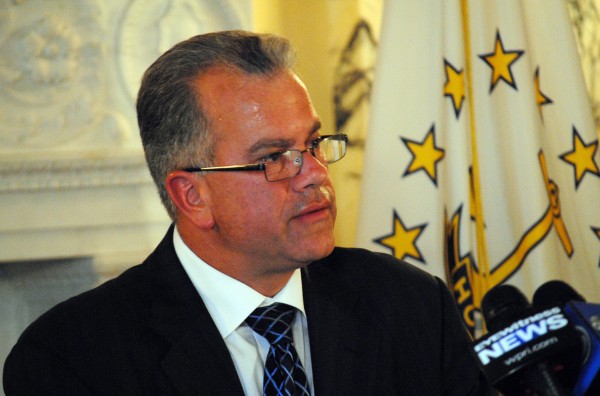
Speaker of the House Nicholas Mattiello also commented on the state’s probation and parole rate, saying that the sentences are too long, making Rhode Island an outlier among other states. Putting someone on probation or parole for too long, Mattiello said, will “take the wind out of their sails, and you take away their hope of becoming productive members of the community in the future.”
As a lawyer, Mattiello has seen sentences that have gone upwards of 20 or 30 years. These sentences create an unbalanced system that can affect someone for the rest of their lives.
“If you’re on probation for 30 years, sometimes that can put you into your 80’s,” he said, also adding that sometimes thoughtful, alternative sentencing options can be better than harsh ones.
“Those that are not the most dangerous and violent, may be better served with less severe and restricting sentencing options,” he said.
Savage, who served on the Superior Court for more than two decades, believes that her place on the working group is a way for her to give back to the state. She told the story of a man she called Michael that had been arrested for breaking and entering into a home while drunk, looking for a place to sleep.
“It would have been easy to send Michael to prison for breaking and entering, and be done with it,” she said. But, she made another choice to have him sent to treatment instead.
“We exchanged loads of prison dollars for treatment dollars, but more importantly, we helped Michael,” she said. “That’s what motivates me. I want to make this system work better for all of us.”
Savage spent last year teaching a symposium on mass incarceration at Roger Williams University Law School, where she was able to lead the discussion on how to solve issues that the working group plans to tackle.
“Together, I firmly believe that we can achieve greater justice,” she said.
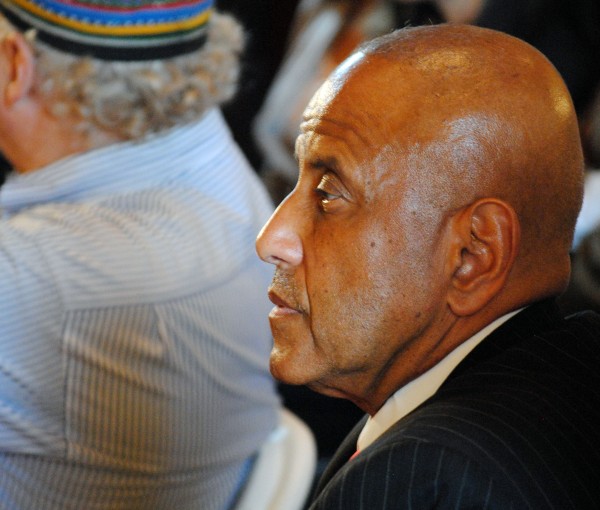
While some of the speakers did not quite touch upon the question of racial disparity in the criminal justice system, James Vincent, the President of the Rhode Island NAACP, said that he believes the initiative will help the issue.
“I think this is something that is very needed in this state,” he said. “I’m particularly interested in the racial disparity aspect of the work we’re going to be doing, and hopefully we’ll end up in a much better state because of this effort.”
Vincent will be serving in the work group, along with other members of the legislative, judicial, and executive branches, as well as members of other groups throughout the state.
Governor Raimondo’s executive order is not the first action that the state has taken to reinvest in the justice system. In 2008, House Bill 7204 enhanced parole discretion and standardized credits for the first time someone has served. Since the bill was adopted, the incarcerated population has dropped 19 percent, along with the recidivism rate.
]]>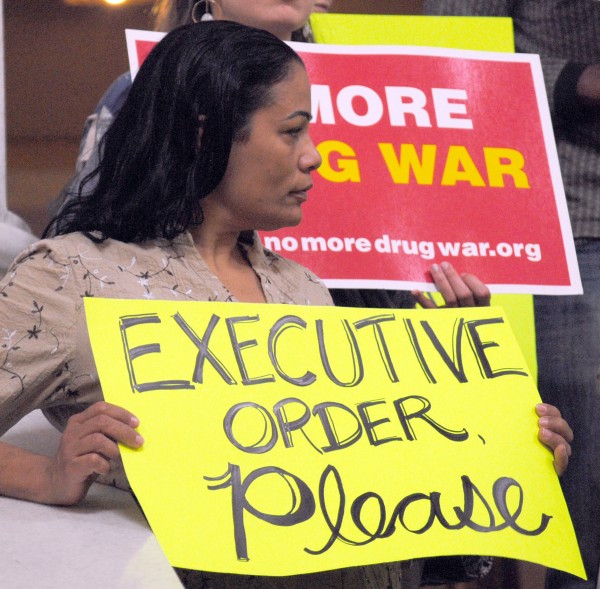 The General Assembly’s recess last Thursday has shown to have tumultuous effects, leaving several bills in legislative limbo. But, today at the State House, protestors made it known that for the Good Samaritan bill and those it seeks to save, anything is better than dying a preventable death.
The General Assembly’s recess last Thursday has shown to have tumultuous effects, leaving several bills in legislative limbo. But, today at the State House, protestors made it known that for the Good Samaritan bill and those it seeks to save, anything is better than dying a preventable death.
The Good Samaritan Overdose Prevention Act, put into law in 2012, has three sections that help to protect those who have experienced a drug overdose. The first allows someone to admit an “opioid antagonist” to the victim. This antagonist helps to reverse the effects of an overdose, and can save lives. A popular drug that has been used under the Good Samaritan law is called Naloxone, or Narcan.
The second prevents those who have overdosed from being charged with a crime. Before the law, it was possible that someone could overdose, and nobody would call 911 out of fear of legal repercussion. The Good Samaritan Act makes it safer for them to seek medical assistance. The third portion of the act dictates that the Attorney General’s office will release a report each year that outlines the effects of the act on law enforcement.

Originally, law had a three-year sunset provision on it. But, with the abrupt recess of this year’s legislative session, the Good Samaritan Act could not be renewed, and expired today, July 1. Supporters of the act gathered on Smith Hill today to voice their concerns for Rhode Island if the bill is indeed allowed to expire, including Governor Gina Raimondo.
“Drug overdose is the leading cause of accidental death in Rhode Island,” she said. “It’s a public health crisis and it’s time for greater action.”
Raimondo said that it is “unacceptable” that Rhode Island has the highest overdose rate in New England, and that everyone should be first and foremost focused on saving lives. Although there is not one solution, she said that the Good Samaritan Act is a step in the right direction for an “all hands on deck effort.”
“As a mother, with two little kids, I want my kids to be protected, and every kid to be protected,” she said.
Raimondo also expressed how discouraged she was with the General Assembly for simply letting the law pass them by this session, imploring that they “get to work.”
The theme of protecting families was a resounding one as supporters continued to speak, citing that nobody should fear calling 911 to save someone they love.

“We’re here today to address the need to protect families,” Holly Cekala, the executive director of Rhode Island Communities for Addiction Recovery Efforts, said. “All families have the right to protect their family members from any illness.”
Cekala said addicts can, and do, recover. The Good Samaritan Act will not only save an addict’s life, but put them on that path to recovery as well.
“We have a feeling that families matter. You can’t get to recovery if you’re not alive,” she said.
John Prince, an organizer for the Behind the Walls Prison Committee, as well as Direct Action for Rights and Equality, related that many in his community are on parole or probation, and that they will not call 911 if they have a police record, and especially if they know they can get arrested for it.
“The General Assembly is basically saying our lives don’t matter,” he said. “The governor needs to sign an executive order to protect all victims and save lives. They need to get this thing right to have protections for all men and women. And they need to do it now.”

Rebecca Nieves McGoldrick, the executive director of Protect Families First, put the blame on Attorney General Peter Kilmartin for the act’s expiration, along with the General Assembly.
“Their actions right now, speak louder than their words,” she said. McGoldrick added that for the opinions of Kilmartin to outweigh the Good Samaritan act’s support simply isn’t right.
“To have families suffer through the loss of a loved one so that the Attorney General could add another notch to his belt of drug arrests is frankly unconscionable,” she said.
Not all members of the General Assembly wanted to see this legislation die, though. Representative Aaron Regunberg (D- District 4), said that he would like to see the body reconvene and put the bill through as soon as possible. If that were to happen, Regunberg said that he would try to rally support for the act.
“I’m certainly going to be reaching out and making sure folks up there understand how urgent it is,” he said.
The odds of a special session in September are split right now. House leadership would like to reconvene at that time, but on the Senate side they don’t. Many have urged Governor Raimondo to issue an executive order, but her office has not indicated any such plans. Either way, supporters all agree that something, anything, must be done.
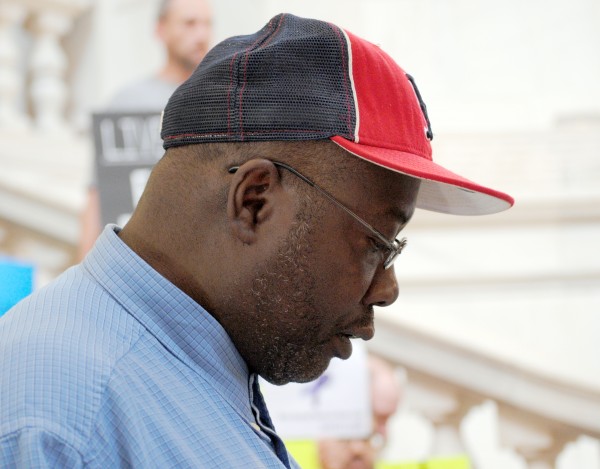

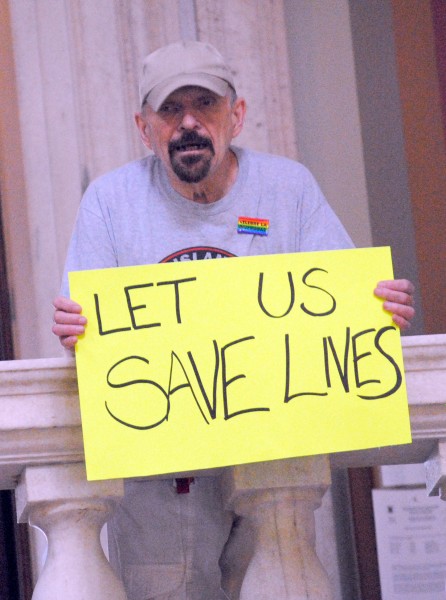

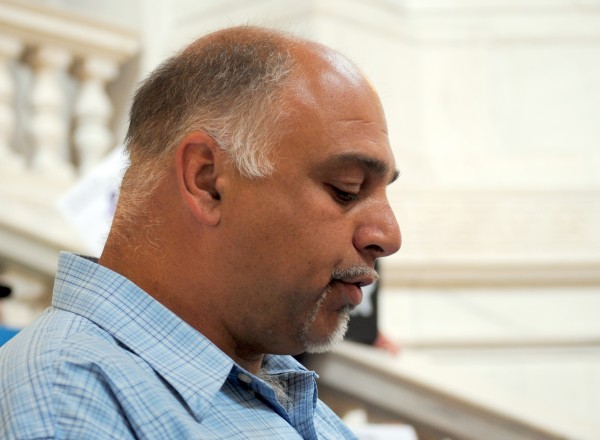
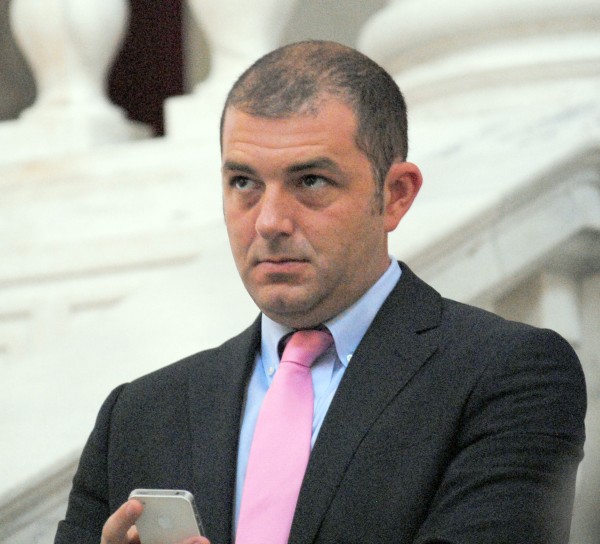
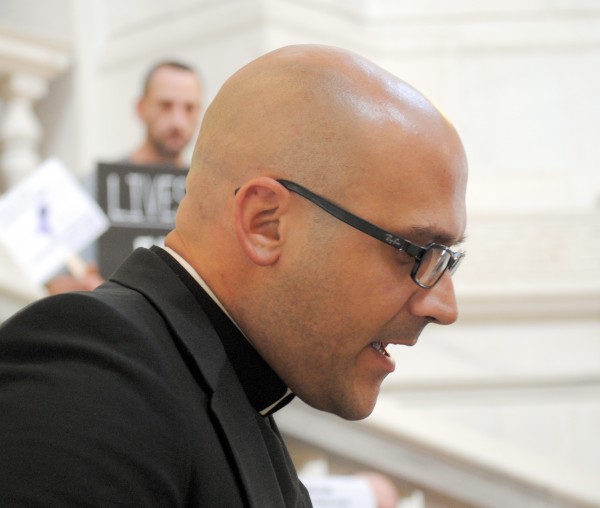
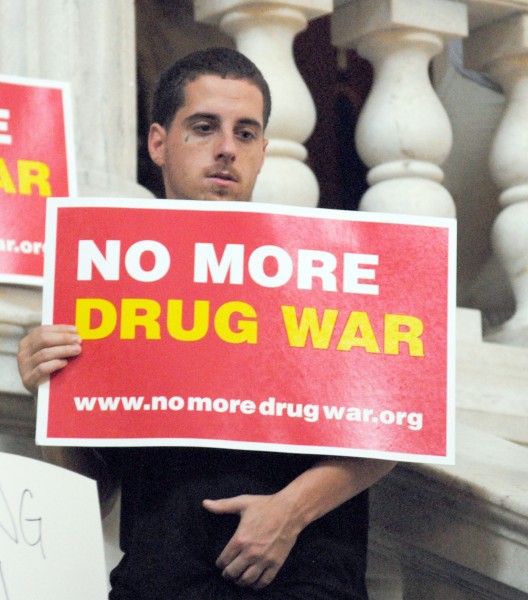
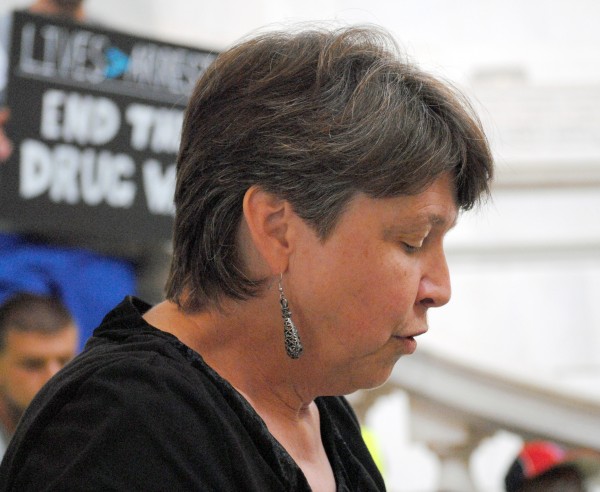
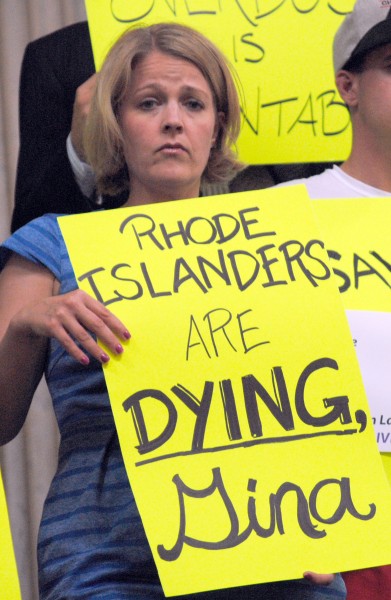
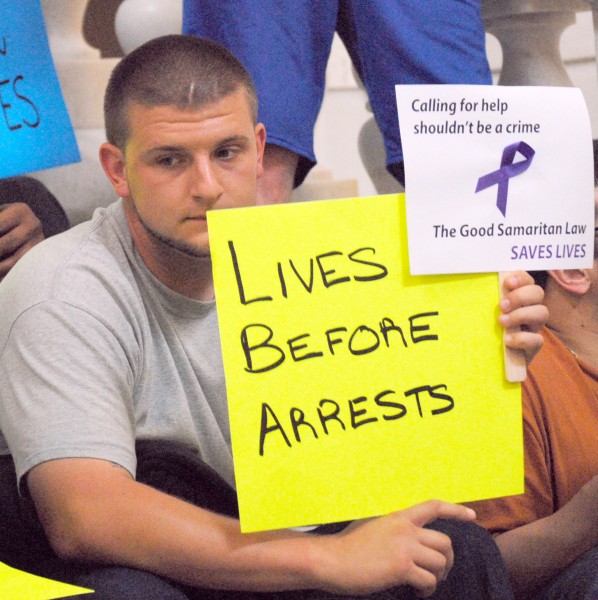
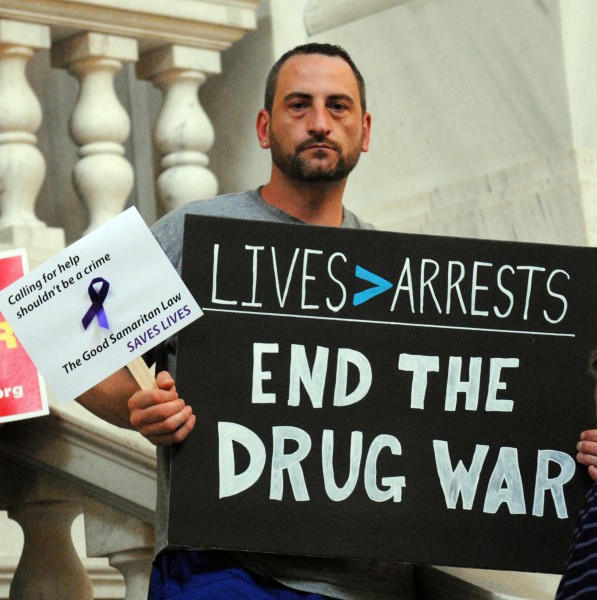
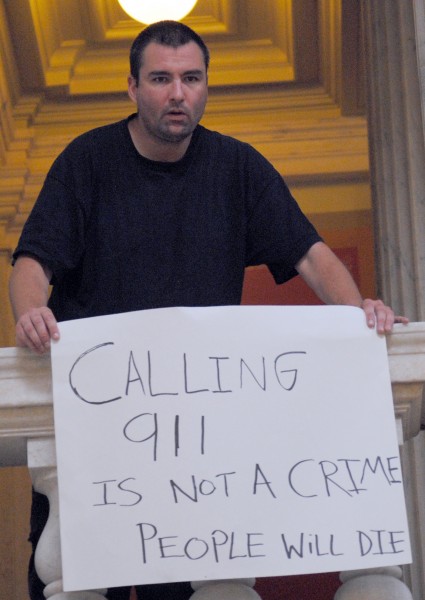
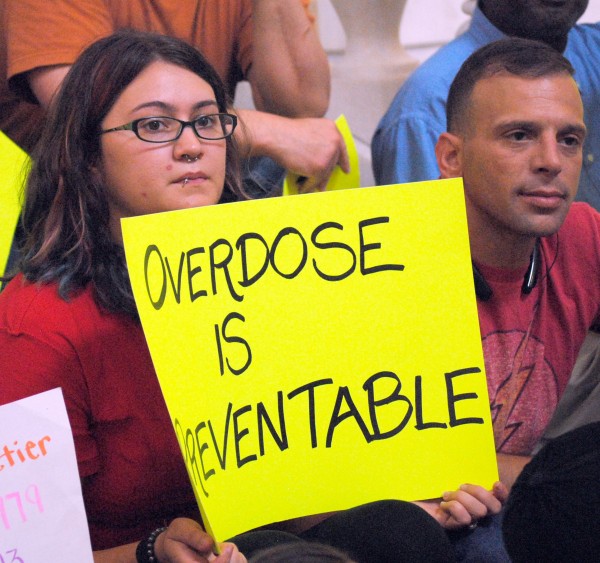
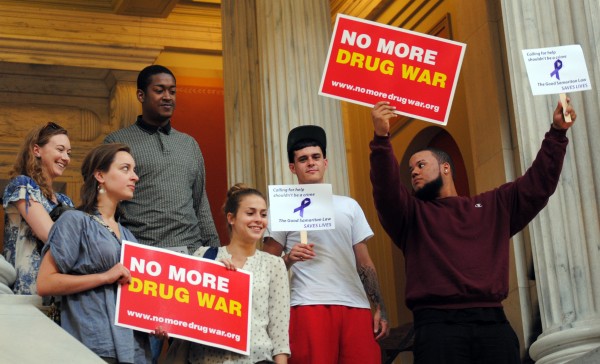

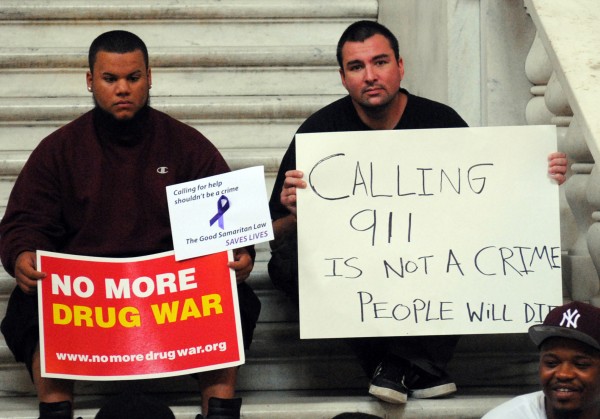

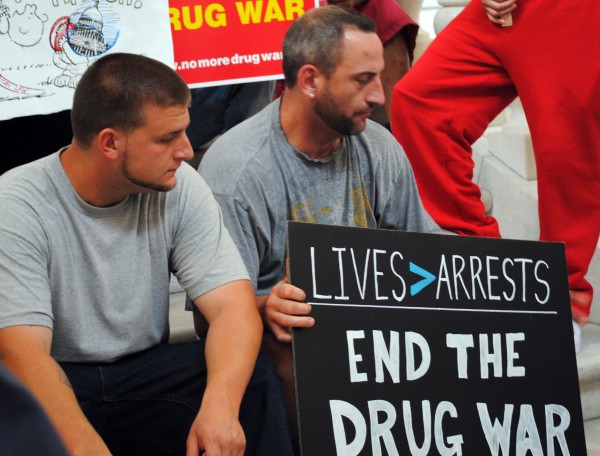

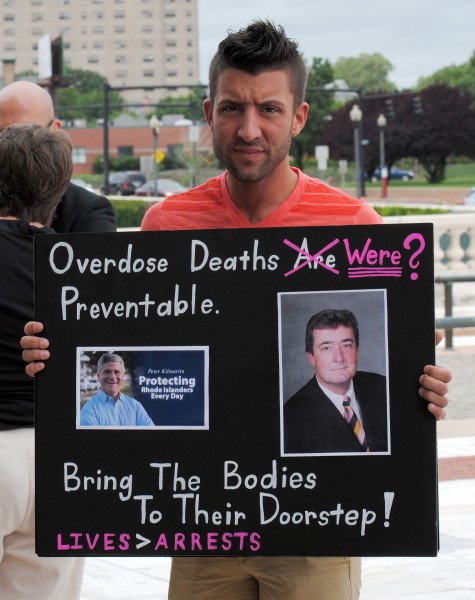
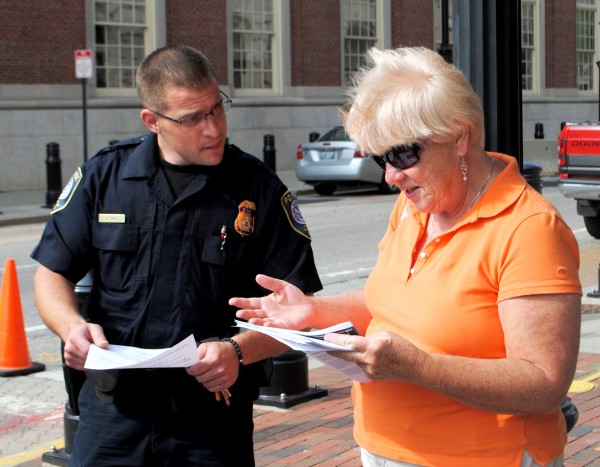 The House Judiciary Committee heard testimony on the Comprehensive Community Police Relations Act, (CCPRA) H5819, a bill that seeks to combat racial profiling by requiring “all police departments to submit to the Office of Highway Safety an annual report indicating what action has been taken to address any racial disparities in traffic stops and/or searches.”
The House Judiciary Committee heard testimony on the Comprehensive Community Police Relations Act, (CCPRA) H5819, a bill that seeks to combat racial profiling by requiring “all police departments to submit to the Office of Highway Safety an annual report indicating what action has been taken to address any racial disparities in traffic stops and/or searches.”
The act would also prohibit police officers from asking juveniles and adult pedestrians if they will consent to be searched. Right now, a police officer who lacks probable cause to conduct a search is allowed to ask permission to search pockets and backpacks. Preventing police officers from asking for permission to conduct searches of citizens who present no probable cause protects juveniles from being intimidated into giving assent.
The bill under consideration is the culmination of at least 12 years of effort on behalf of community organizations and members of law enforcement. Providence Public Safety Commissioner Steven Paré helped craft the bill in a way that would satisfy a wide range of concerns. The meetings were held in an open and forthright manner and anyone was welcome to join in.
Why then does Attorney General Peter Kilmartin‘s office oppose the bill?
Special Assistant Attorney General Joee Lindbeck testified that the AG’s office opposes the bill because it would require police officers to ask permission to search juveniles. She also said that the Attorney General’s office was not privy to the meetings between law enforcement and community group’s where the bill was put together.
Under questioning from Representative Edie Ajello, Lindbeck admitted that under current law, a police officer without probable cause cannot ask for consent to search your automobile, but is allowed to ask for consent to search an adult pedestrian or juvenile. Doesn’t this, asked Ajello, protect the privacy of automobile drivers more than the privacy of adult pedestrians and juveniles?
“That is a position you could take, I believe,” replied Lindbeck.
Michael Évora, director of the Rhode Island Commission for Human Rights, took issue with the Attorney General’s position on the bill. The bill does not prohibit a police officer from searching an adult pedestrian or juvenile if there is probable cause. It only prevents a police officer from asking for permission if there is not probable cause. This does not amount to a public safety issue, as Lindbeck asserted, said Évora.
Évora also took issue with the idea that the Attorney General’s office was somehow unaware of or not able to attend the meetings between community organizations and law enforcement officials where the bill was painstakingly crafted. “The meetings were always open,” said Évora. Further, Évora maintains that Commissioner Paré and Attorney General Kilmartin met weekly on a variety of issues, and that Kilmartin was surely informed about the content of the bill. “It is disingenuous at best,” said Évora, “to say the Attorney General was not aware.”
Speaker after speaker addressed the necessity and immediacy of the CCPRA.
Jim Vincent of the RI NAACP spoke of the importance of this legislation in building some sense of trust between communities of color and the police. “There is no need for a Rhode Island name,” said Vincent, “to be added to the long list of young men and women who have needlessly lost their lives due to police violence.”
“If we have hopefully learned anything from the outbreaks in Ferguson, Cleveland, Staten Island and of course the recent unrest in Baltimore,” said Jordan Seaberry, chairman of the Univocal Legislative Minority Advisory Commission, “it is that we cannot afford to avoid the question of race in our society.”
Seaberry went on to say that the legislators in the General Assembly “are tasked with creating the conditions for Rhode Islanders to prosper.”
“As long as racial profiling exists, we in fact are dooming families, neighborhoods [and] communities to [the] fringes. We cannot have prosperity without equity.”
Ray Watson, director of the Mt. Hope Community Center was offended that the Attorney General’s office would suggest that the process of developing the bill was not open and inclusive. He was doubly offended that the rights of juveniles were held to a lower standard than the rights of automobile owners.
Prompted by Rep. Edie Ajello, Watson spoke about being stopped and searched by the police, and the effect police harrassment has on young people of color. “It gets to a point that when you’re a youth and you’re out in the community, I mean, there’s only so much your parents can do to protect you. So you get to a point where you’re like, ‘you know what, as long as I didn’t get arrested or I didn’t hurt it’s fine’ but it definitely breeds resentment towards law enforcement.”
In compelling testimony, Ann DeCosta spoke of her concern for her 23 year old son, a recent graduate of the University of Rhode Island. The problems of raising a child are multiplied when raising a young man of color in this society, says DeCosta, “From a young age I taught my child, if you get separated from me, if you are hurt, if you need assistance, look for that badge… that’s the person you need to trust.”
But, when her son got older, and went to URI, her son told her that, “he gets stopped, 3 or 4 times a month in North Kingstown and Narragansett… I find this very upsetting… Everyone in the car is asked for ID, sometimes they’re pulled out of the car and searched for reasons such as having an air freshener hanging from the mirror…”
When Eugene Montero sent his son to the store for some milk in Coventry, his son was stopped by a police officer and told to turn out his pockets because he “fit the description” of someone selling drugs. When Montero called the police station to complain about his son’s treatment, the police had no record of the incident. “What I’m sad to say,” said Montero, “is that my kids have had several incidents since moving back to Rhode Island. My two boys who are now grown, have moved. They live in Florida.”
When Mike Araujo was 14 years old, he was beaten “very badly” by a police officer. “I had my skull split. I had my eye orbit broken. I had my jaw broken. My fingers broken. He broke my ankle. I remember that he stepped on my knees to prevent me from standing up.”
When Araujo became an adult, he tried to look into the beating he had endured. “When I looked into the record, I found it was really hard to find my own name. I finally found it, it was ‘African American male, approximately 18,’ (I was 14), ‘resisted arrest on Westminster St.'”
As these stories show, presently there is little to know accountability. Without the police keeping accurate records of all stops and searches, there is no way to introduce policies to curb abuses and racism. The Comprehensive Community Police Relations Act would be a great start in the right direction.
]]>
Rep. Chris Blazejewski introduced House bill 5650, sparking a debate in the Rhode Island House Judiciary Committee hearing as to whether or not juvenile defendants should be subject to mandatory life sentences without parole. The American Bar Association, Amnesty International and the ACLU are just three highly regarded civil and human rights groups who have called for an end to this practice.
Juan Méndez, the United Nations special rapporteur on torture and other cruel, inhumane or degrading treatment or punishment, said, in a recent report, “The vast majority of states have taken note of the international human rights requirements regarding life imprisonment of children without the possibility of release.” And, “life sentences or sentences of an extreme length have a disproportionate impact on children and cause physical and psychological harm that amounts to cruel, inhuman or degrading punishment.”
According to Amnesty International, in written testimony submitted at the hearing, “The UN Convention on the Rights of the Child expressly prohibits life imprisonment without the possibility of release for crimes committed by people under 18 years of age. All countries except the USA and South Sudan have ratified the Convention. Somalia just recently ratified the treaty in January 2015 and South Sudan has already begun the process to become a signatory to the Convention.”
What a terrible place for the United States to find itself as an outlier.
The United States Supreme Court has been evolving on this issue for a decade. In 2012 the Court ruled in Miller v. Alabama that “mandatory sentences of life without the possibility of parole are unconstitutional for juvenile offenders,” yet stopped short of issuing a blanket ban. Judges are simply required to consider the defendant’s youth and the nature of the crime when determining a sentence.
Rhode Island has a historical claim to judicial sentencing temperance, having eradicated the death penalty in 1852. Yet on the issue of life sentences for juvenile defendants, our state is lagging behind. Al Jazeera reports that, “Fourteen states and the District of Columbia have banned life sentences without parole for juveniles.”
Recognizing the potential for rehabilitation, especially of juvenile defendants, is one of the hallmarks of a civilized society. Attorneys general in other states are getting behind similar legislation, according to testimony from Steve Brown of the RI ACLU, yet Attorney General Peter Kilmartin opposes the bill currently under consideration.
Speaking against the bill, Joee Lindbeck, who heads the AG’s Legislation and Policy Unit, brought up the specter of Craig Price, who committed four murders in 1989 while under the age of 16. Reacting to Price’s crimes, the General Assembly “passed a law in 1990 to allow the state to prosecute as an adult any juvenile charged with a capital offense.” Lindbeck maintains that keeping this law on the books prepares us for “worst-case scenarios” like Price.
From a prosecutors point of view, having draconian sentences on the books is important because of the leverage they provide. A kid who committed a crime is much more willing forgo a trial and plead out to a 10 or 20 year sentence if the AG has the power to potentially ask for life without parole. This brings up a question: Should we be empowering the AG with tools to intimidate, or tools to render justice?
Threatening defendants with life destroying sentences seems to save money in the short term, but in long run we have learned that such “cheap justice” is neither.
]]>
What a difference a word can make. Or, in the case of Senate Bill 2602, three words. The proposal, said co-sponsor Sen. Gayle Goldin, was originally worded to target sex traffickers. But by changing the phrase “in order to commit” to “or” the legislation would also target sex workers, too.
Goldin was the only member of the Senate to vote against the bill last week and is urging her House colleagues to similarly reject it when they consider it on Tuesday.
“On its surface, it may appear that this law is necessary to catch more of the bad guys,” she said. “In reality, the wording of this bill conflates sex trafficking with prostitution.”
The amendment to state law 11-67-3 initially read, “Trafficking of persons for forced labor or commercial sexual activity” read (with added emphasis on altered phrase): “Whoever knowingly … Recruits, entices, harbors, transports, provides, or obtains by any means, or attempts to recruit, entice, harbor, transport provide, or obtain by any means, another person, intending or knowing that the person will be subjected to forced labor in order to commit a commercial sexual activity…”
Steve Brown said the ACLU thinks the bill casts an overly broad net. “It’s not just prostitutes,” he said. “What if a prostitute uses a particular cab driver.” He said the bill as written could mean that cab driver is guilty of sex trafficking.
The language change was suggested by Attorney General Peter Kilmartin “to clarify that trafficking applies to both forced labor and commercial sexual activity,” said spokeswoman Amy Kempe.
“Currently, the section provides that in order to prove trafficking, the State would have to provide that the person trafficked another knowing that they would be subject to forced labor in order to commit commercial sexual activity,” Kempe said. “Forced labor and commercial sexual activity are two distinct acts under that chapter and should be treated as such.”
But Goldin said the slight change has fouled the intent of the legislation.
It “would mean that the penalties intended specifically for the traffickers could also be used to penalize sex workers themselves,” she told me in an email. “If this bill makes it to the Governor’s desk, instead of protecting the sex workers who are being victimized by these horrendous acts of trafficking and ensuring they receive the level of intensive services they need, we will potentially prosecute them. Rhode Island’s human trafficking law was the result of careful, deliberate work to determine a way to strengthen protections for anyone in our state who is being forced into performing labor of any type, including sexual activity. This bill’s change to the law undermines the very intention of the statute.”
]]>
This past week, the House Labor committee heard from “Ban the Box” supporters, including a short film to illustrate the challenge of finding employment, and a new life, with a criminal past.
The film (available here) makes the case for House Bill H5507, known as “Ban the Box.” This piece of legislation removes that question, “Have you ever been convicted of a crime?” from job applications and provides key protections against employment discrimination for people with records. The bill is sponsored by House Representatives Slater, Chippendale, Williams, Almeida, and Diaz.
The film features employers and job applicants who would be directly affected by the legislation. Additional interviewees include Michael Evora of the Rhode Island Human Rights Commission; AT Wall, Director of the Rhode Island Department of Corrections; Misty Wilson, Organizer at the community organization Direct Action for Rights and Equality (DARE) as well as some of the bill’s sponsors. In the film, AT Wall calls employment opportunity “the key pillar” to success re-entry and Michael Evora says that Ban the Box is “one of the most important civil rights issues of our time.”
Opponents are uninformed, or hoping you are.
The Attorney General has been less-than-accurate in his depiction of the law and liability, by saying that it would be “unlawful,” under the legislation, for an employer to deny an applicant a job “based on his or her criminal record… [unless] there is a direct relationship between one or more of the previous criminal offenses and employment sought.”
“This act would open every employer in the State, both public and private, to civil liability in the hiring process that may actually have a chilling effect on new employment opportunities.”
There are three other reasons an applicant can be denied:
1. A state or federal law prohibition (such as many school, health care, law enforcement, or CEO positions);
2. Applicant is not bondable;
3. “unreasonable risk to property, or to the safety or welfare of specific individuals, employees, or the general public.”
It is impossible to anticipate any specific judicial interpretation of these reasons, as facts of every case will vary. However, one can safely assume that no RI governor has appointed any “anti-business” and “pro-criminally convicted people” to the bench. If so, I missed it. The fear mongering, of scaring businesses to steer clear, is (a) missing the realities of a statewide economy, and (b) overlooking the fact that Connecticut and Massachusetts have similar laws. This bill is also consistent with EEOC policy on the subject.
Many have overlooked that this law would only apply in scenarios where an applicant has already been offered a job, and then the employer wishes to revoke it based on a criminal record. Clearly the applicant has shown some job-worthiness. Considering most applicants will be people who never went to prison, or recently served small time for a small crime, it would be difficult for someone to “go straight” if years need to tick by… without crime and without a job.
Some have hypothesized that creating a few rules in the employment process violates the freedom of a business or organization to operate freely. Yet this is a right that nobody alive ever enjoyed, as the tax code and regulatory agencies have long subjected businesses and organizations to codes and laws. They have hypothesized that attorneys will file “frivolous” lawsuits, although this would open up such attorneys to sanctions under Rule 11 of the state and federal court rules. Considering all the other avenues for “frivolous” lawsuits, there is no indication that this will now create a new windfall. If one were to file, they might use the federal Fair Credit Reporting Act, one of the few statutes that provide for attorneys fees. The FCRA is currently in effect and there is no allegation of it being used frivolously.
A community must sink or swim together.
The love or hatred in one’s own heart is part of what makes us all human. Most of our beliefs are developed over time, and impacted by our families, schools, neighborhood gossip, television, social media, government policy and more. Policymakers, unlike private citizens, do not have the luxury of saying “I don’t care,” about a particular dilemma; nor are they allowed to have divisive beliefs. Not, at least, if they are trying to develop and build the health of their entire districts. Public policies such as drug prohibition, sending our youth off to war, or the refusal to provide a comprehensive mental health plan, have both intended and unforeseen consequences. Among them is narrowing of employment opportunities after labeling people with a criminal record.
Opponents to the legislation tend to characterize the systematic discrimination and exclusion of people from the job market as fair and responsible. The lifetime of punishments are placed on the shoulders of someone who broke the law, with little (if any) consideration to how long ago and how petty the offense(s) may have been. It is an understandable position to take when placed in the context of America’s long struggle with discrimination. Finally, perhaps, discrimination that everyone can agree upon? Yet just like the ostracism of Black people, women, Latino, gay, and transgender people…most Americans ultimately recognize everyone’s basic human dignity and right to a live in an inclusive society.
Over 100,000 ACI ID numbers in two decades.
When times get tough, such as during a serious lack of available jobs, it is tempting to fragment off and find a “Them” for an “Us” to rise up above. This will not work. We are too intertwined, too interdependent. In the past 20 years, the Adult Correctional Institutions have assigned over 100,000 identification numbers, most of which went to Rhode Island residents. Every one of them is more than a number. And as an employer in the film points out, many will work harder than others because they have something to prove.
This film is part of a larger project documenting the effect of criminal records on employment and re-entry. The film is produced by a team of Providence-based artist and film-makers, Rachel Levenson, Emmett Fitzgerald, Adrian Randall, Jonah David, Victoria Ruiz and Casey Coleman. Numerous community members and organizers have contributed to the writing and production of the film.
Media requests can be made to Rachel Levenson at rachelannalevenson@gmail.com
]]>
Just over a week ago, the British and American governments announced the largest fine in history levied against Barclays PLC, just under half a billion dollars. The fine agreed to ignore criminal charges against Barclays itself, but current and past employees were not exempt. Well, after a letter from Democratic lawmakers (including Rhode Island’s Sen. Jack Reed) to the U.S. Justice Department and regulatory agencies urging criminal charges, that may well be in the works. According to The New York Times, Barclays traders may be among those slapped with criminal charges. Bloomberg reports that those charges could come as soon as September.
The City of Baltimore already filed a lawsuit back when this rate-rigging scandal broke. Now it comes to light that the attorney generals of New York and Connecticut are working together to investigate Wall Street banks over the scandal.
New York attorney general Eric Schneiderman was considered the most high-profile crusader against Wall Street excess until he was co-opted by the pro-Wall Street administration of Barack Obama. That resulted in the $25 billion settlement with America’s largest loan servicers, who were utilizing automated robo-signing to fraudulently foreclose on American homes. Prior, Mr. Schneiderman led a group of dissenting attorney generals who refused to accept the Dept. of Justice’s settlement, believing the banks deserved greater punishment. When he folded, the virtually all of the attorney generals fell into line with the Justice Department (Rhode Island’s attorney general Peter Kilmartin was with the Justice Department from the get-go).
Libor (London Interbank Offered Rate) is an average of the interest of borrowing for London’s banks. It is set by all of the banks submitting to their trade organization (the British Bankers’ Association) the rate they are borrowing at. These rates are then averaged and the average is declared. That is used to set interest on roughly $500 trillion in securities, and 45% of all U.S. mortgages. In the wake of the 2008 Global Financial Crisis, Libor became a measure of banks’ health as other standard measures became suspect and unreliable. In this case, Barclays has admitted to artificially manipulating rates downward.
This means while the interest the average consumer paid on their mortgage was lower, a state or municipal treasury or a large charity that had savings linked to Libor also saw lower returns. As did lenders who sold mortgages bundled into “residential backed mortgage securities”. So while the average person on the street might feel slightly good about the banks’ malfeasance working out for them, states and lenders are certain to feel quite angry.
Is It Time for the White House to Fight the Banks?
The common impetus behind both the Tea Party and Occupy Wall Street appear to have been that Wall Street got away with collapsing the world economy and over a trillion dollars in taxpayer money. And they never faced a single criminal charge.
The Libor scandal seems to be changing that. The British government announced plans to make it the government with the toughest regulations out of any economic center; the City of London (separate from Greater London) is the epicenter of Western capitalism.
Americans already despise Wall Street for its part in the collapse (Wall Street remains the institution most blamed for the bad economy). Wall Street banks, who strongly backed President Barack Obama in 2008, have shifted their financial support almost entirely to Republican challenger Mitt Romney. Barack Obama has mostly played as the banks’ best friend, his bipartisan so-called JOBS Act passed earlier this year further deregulated Wall Street (Rhode Island’s Senators voted against the act, whereas our Representatives voted for it).
But the Libor scandal may be a chance to put right the wrongs done by the administration and the U.S. government in not punishing the banks following the Global Financial Crisis. One hopes that President Obama would do so because it is the right thing to do. However, since the moral calculus has not appealed to this president in the past, perhaps the political calculus will. This is a rare case of good politics and good policy aligning.
With the big banks having cut the President loose, he does not need to worry about angering potential donors; indeed, charging bankers for the very real crimes they have committed seems likely to energize those who have long feared the President is a stooge of Big Banks. Furthermore, the Libor scandal (and the money-laundering over at HSBC) has proven beyond a doubt that the financial system cannot be allowed to police itself. When given the choice between theft and honesty, banking culture is so toxic they will praise theft before they stoop to honesty.
Unfortunately, Republican obstructionism is undoubtedly assured to block any chance of enacting tough new rules through legislation. And conservative litigation as regulators write new rules is also likely to prevent any real strengthening of the oversight under the flawed Dodd-Frank reform. This means all the government can do is press charges. Indeed, this very public action may be preferable from a political stance; the sight of bankers in court is likely to please many of the hundreds of American families who have wound up in foreclosure proceedings at the hands of such reckless prophets of our financial system.
]]>
